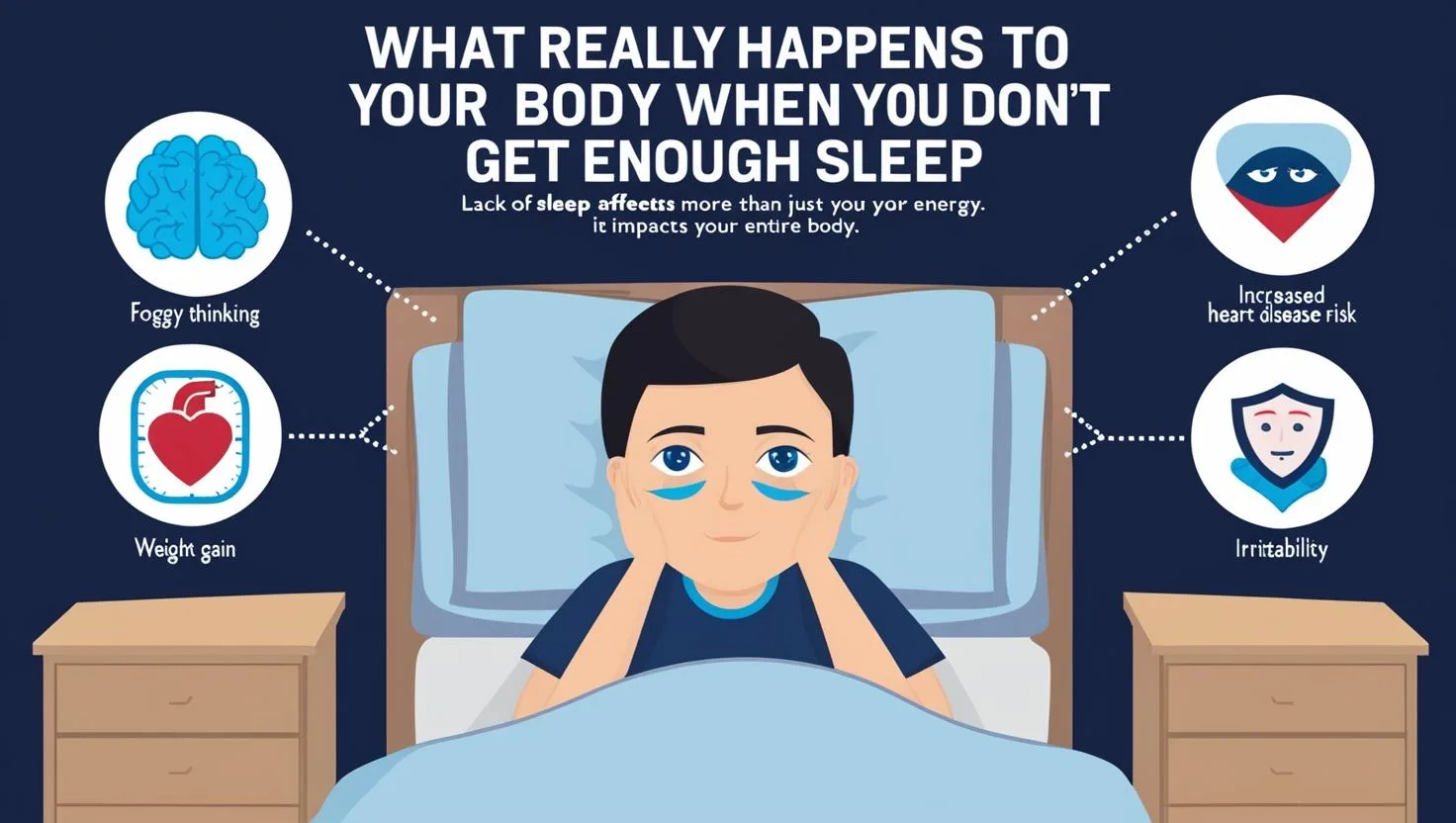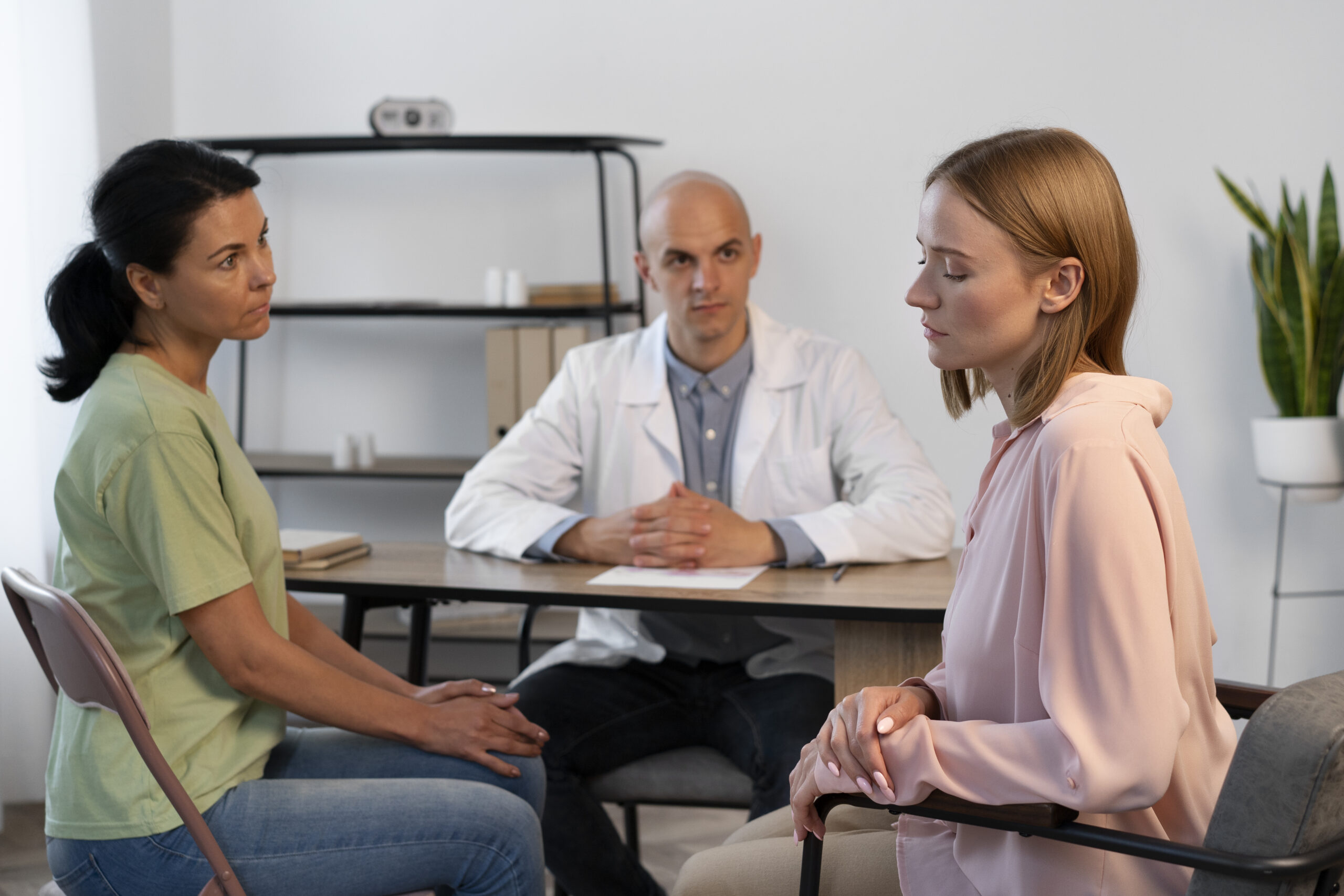Ever lie awake at 3 AM scrolling through your phone, knowing you will regret it tomorrow?
Many of us underestimate the real cost of skipping sleep. brushing it off as just another “tired day.”
No sleep is really hurting you a lot more than you think. Your body suffers every time you do not get enough rest. Sleep deprivation makes you tired. It can also disrupt your hormones, trigger chronic illnesses, and, yes, even shorten your lifespan.
What, then, does a lack of sleep actually do to your body?
In this blog post, we will explain the science, symptoms, and how to get a good night’s sleep to regain energy, focus, and health.

Effects of lack of sleep on the body
Now look at what happens to your body when you do not get enough rest. It may be affecting you unknowingly.
Your Brain
Sleep is like a mental reset button. Your brain builds and strengthens neural connections while you sleep. This helps you learn, remember things, and stay sharp.
But when do you not get enough sleep?
- Your reaction times slow down
- Concentration takes a nosedive
- Mood swings sneak in
- You might make impulsive decisions or feel emotionally off
It gets worse. Chronic sleep deprivation can even lead to hallucinations or worsen existing mental health issues like anxiety or depression. Some people experience microsleep. Microsleep is a quick, uncontrolled doze that happens without warning.
Imagine that happening behind the wheel. Scary, right?
Your Immune System
Your immune system is busy making infection-fighting soldiers like cytokines and antibodies while you sleep. But without enough rest, your defenses weaken. That’s why lack of sleep makes you more likely to catch a cold and take longer to recover.
Over time, poor sleep is also linked to chronic diseases like
- Heart disease
- Diabetes,
- Some types of cancer
Your immune system can not do its job if you do not give it time to recharge.
Breathing Issues
If you have ever had sleep apnea, you know how disruptive it is. Your breathing stops and starts, waking you up multiple times a night. However, it’s important to note that sleep deprivation due to poor breathing also reduces lung function and heightens the risk of respiratory infections. It is a frustrating cycle that can seriously wear your body down.
Cravings, Obesity, and Crazy Metabolism
Ever wonder why you reach for cookies or chips when you are tired?
Blame hormones. Sleep affects leptin and ghrelin. These are the hormones that regulate hunger.
- Less sleep = less leptin (the “I’m full” hormone)
- More ghrelin (the “Feed me!” hormone)
That means you are hungrier and less satisfied after eating. Likely to eat too much. Add in the fact that you are too exhausted to work out, and it’s easy to see how lack of sleep contributes to weight gain.
And here is another twist: sleep helps your body use insulin effectively. Without it, you are at a higher risk of insulin resistance. These conditions can ultimately result in the development of type 2 diabetes.
Your Heart Needs Sleep, Too
Your heart is no fan of sleepless nights. Lack of sleep can mess with:
- Blood pressure
- Inflammation levels
- Glucose metabolism
All of these increase your risk of heart attacks and strokes. Your cardiovascular system relies on good sleep to repair and reset every night. Without sleep, your cardiovascular system performs poorly, like running a marathon without training.
Hormones and Growth
Sleep plays a key role in hormone production. Your body releases growth hormone and testosterone during the deeper stages of sleep. This is especially important for kids and teens. But it also matters for adults. These hormones help
- Repair tissues
- Build muscle
- Keep your metabolism in check
No sleep? Your hormone production goes off balance. And that can affect everything from your energy levels to your mood.
This video features expert insights from Matthew Walker on the serious consequences of sleep deprivation. He discusses how insufficient sleep affects memory formation, weakens immune defenses, and raises the risk of major health conditions like cancer and heart disease. The video also stresses the critical role of deep sleep in resetting the brain and body daily.
Can You Actually Faint from Lack of Sleep?

It is rare. But yes, you could faint from lack of sleep. Severe sleep deprivation can lower your blood pressure and disrupt brain function enough to make you feel dizzy or even pass out. So if you are constantly running on empty, do not ignore it. Your body is trying to tell you something.
Dizziness, Headaches, and Nausea? Blame Sleep Deprivation
Are you experiencing dizziness or nausea without a clear reason?
You are not imagining things. Does lack of sleep cause dizziness? Absolutely. It affects your inner ear balance and cognitive processing. It can also cause nausea, especially when your body is exhausted and stressed.
What about headaches? You have guessed it. Can lack of sleep cause headaches? For sure. Migraines and tension headaches are common in people who don’t sleep well. And they tend to feel worse, too.
Skin and Hair: The Surprising Victims
It is true that getting enough sleep is essential for maintaining your beauty. Lack of sleep increases inflammation and messes with hydration. It also throws off your hormonal balance. Which can lead to acne breakouts.
And let’s talk about your hair. Does lack of sleep cause hair loss? It can. Chronic stress from poor sleep can push hair follicles into a resting phase. This leads to more shedding and less growth.
Can You Die from Lack of Sleep?

It is a scary thought. But yes. In extreme, prolonged cases, you can die from lack of sleep. Sleep deprivation can cause organ failure, heart issues, and even death.
That is a strong reminder of how important sleep really is. But luckily most of us will not get that far.
How to Get Back on Track?
The answer to sleep deprivation is simple in theory: aim for 7 to 9 hours a night. But if you have been stuck in a cycle of poor sleep, it is not always easy to fix.
You may be dealing with a sleep disorder, such as
- Insomnia
- Sleep apnea
- Restless leg syndrome
- Circadian rhythm disorder
- Narcolepsy
A doctor or sleep specialist can help you figure out what is wrong. They might recommend a sleep study, medication, or lifestyle changes.
Once you start sleeping better, many of these symptoms can improve or even disappear.
Final Thoughts
Your body is not designed to function without rest. Lack of sleep may seem harmless in the short term. But over time, it chips away at your health, your mood, and your energy.
So the next time you think about skipping sleep to binge another episode or finish that late-night task, ask yourself, is it really worth it?
Your brain, heart, and skin—and even your hair—are all rooting for you to catch those Zzzs.
FAQs
What Actually Happens When You Don’t Get Enough Sleep?
Your body struggles to fight off germs, focus gets fuzzy, and your mood tanks. Long-term sleep loss weakens your immune system.
Is It Okay To Sleep Only 5 Hours A Night?
Not really. Most adults need 7–9 hours. Five hours might leave you foggy, irritable, and more prone to getting sick.
How Can You Bounce Back After A Sleepless Night?
Hydrate, eat a healthy breakfast, get sunlight, and sneak in a power nap if possible. Avoid overloading on caffeine—it backfires later.
What Happens If Teenagers Don’t Get Enough Sleep?
Teens need extra sleep for brain growth. Skimping on rest messes with memory, mood, focus, and even immune health.
What Does Your Body Do When You Can’t Sleep?
Your stress hormones rise, immune defenses drop, and concentration wobbles. Chronic sleep loss also increases risk of colds and flu.







